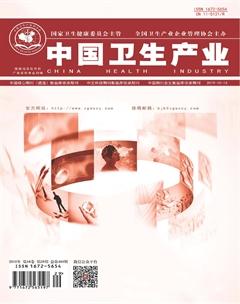护士分层管理对消化内科护理质量的影响
何佳孟

[摘要] 目的 探究护士分层管理对消化内科护理质量的影响。方法 选取该院消化内科2017年12月—2018年12月期间收治的住院患者106例,其中53例采用传统护理管理,为对照组;另外53例采用护士分层管理,为观察组。比较分析两组的护理质量评分、护士行为评分、患者健康教育知晓度、患者遵医行为、患者投诉率和护理服务满意度。结果 与对照组相比,观察组护理质量评分、护士行为评分、患者的健康教育知晓度、患者遵医行为以及护理满意率较高,其患者投诉率较低,差异有统计学意义(P<0.05)。结论 在消化内科护理管理中采用护士分层管理能改善患者的健康教育知晓度、患者遵医行为、提升护理满意度,减少患者投诉,值得临床进一步推广使用。
[关键词] 护士;分层管理;消化内科;护理质量;遵医嘱行为;护理满意度
[中图分类号] R473 [文献标识码] A [文章编号] 1672-5654(2019)10(b)-0016-03
Effect of Stratified Management of Nurses on the Quality of Digestive Medicine Nursing
HE Jia-meng
Department of Gastroenterology, Yilong County People's Hospital, Nanchong, Sichuan Province, 637000 China
[Abstract] Objective To explore the effect of stratified management of nurses on the quality of digestive medicine nursing. Methods A total of 106 inpatients admitted to our Department of Gastroenterology from December 2017 to December 2018 were enrolled. Of these, 53 cases were treated with traditional nursing management, and the other 53 cases were managed by nurses. The nursing quality score, nurse behavior score, patient health education awareness, patient compliance behavior, patient complaint rate and nursing service satisfaction were compared and analyzed. Results Compared with the control group, the observation group's nursing quality score, nurse behavior score, patient's health education awareness, patient compliance behavior and nursing satisfaction rate were higher, and the patient complaint rate was lower, the difference was statistically significant(P<0.05). Conclusion The use of stratified management of nurses in the management of digestive medicine can improve the health education awareness, patient compliance behavior, improve nursing satisfaction, and reduce patient complaints. It is worth further clinical promotion.
[Key words] Nurse; Stratified management; Gastroenterology; Quality of care; Compliance with doctor's behavior; Nursing satisfaction
消化內科的诊疗范围主要是针对发生于食管、胃、肝、胆、胰腺、大肠、小肠等部位的疾病,该科室的疾病种类较多,涉及到很多方面的医学知识。在疾病治疗中,护理操作流程复杂繁琐,需要患者主动配合治疗,才能促进其病情的早日康复[1]。因此,对于消化内科患者,护理干预的作用十分重要,需要对其进一步加强管理。护士分层管理是一种新型的护理管理模式,其通过对护士人力资源进行合理配置以提高护理质量,在临床很多科室护理中均具有良好效果[2]。为此,该文以该院消化内科2017年12月—2018年12月期间收治的106例患者为研究对象,分析护士分层管理对护理质量的影响,现报道如下。
1 资料与方法
1.1 一般资料
在该院消化内科收治的患者中抽取106例,分为对照组和观察组,各53例。对照组男28例,女25例;年龄为20~65岁不等,平均年龄为(43.76±6.27)岁;上消化道出血20例,黄疸14例,肝硬化14例,其他5例。观察组男30例,女23例;年龄为21~62岁不等,平均年龄为(44.28±6.39)岁;上消化道出血21例,黄疸13例,肝硬化15例,其他4例。所有患者或其家属均具有知情权,且自愿加入该研究,排除认知功能障碍、精神类疾病以及临床资料不完整患者。两组患者在年龄、疾病类型以及性别等一般资料上差异无统计学意义(P>0.05),具有可比性。

